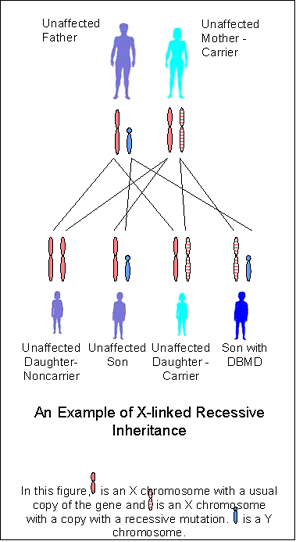| Single Gene Disorders and Disability (SGDD) |
X-linked conditions usually affect
only males. A mutation causing a condition can be passed in the family
through female carriers who do not have the condition. However, each son of
a female carrier has a 50% chance of inheriting the mutation and, therefore,
of having the condition.
“X-linked” genes are genes that are
found on the X chromosome. “Recessive” means that a person can have the
condition only if he or she does not have at least one usual copy of the
gene.
A female has two X chromosomes and,
therefore, two copies of each X-linked gene. A woman who has one usual copy
and one copy with a recessive mutation is called a carrier. She does not
have the condition, but can pass the copy with the recessive mutation on to
her children.
A male has only one copy of the X
chromosome, which he has gotten from his mother. If the copy that he gets is
the copy with the recessive mutation, he will have the condition because he
does not have a usual copy of the gene. If he gets his mother’s X chromosome
that has the usual copy of the gene, he will not have the condition.
Therefore, a son of a carrier mother has a 50% chance of having the
condition. A male who has the condition passes his X chromosome to each of
his daughters, so each daughter will be a carrier. A male with the condition
passes his Y chromosome to each of his sons, so none of his sons will have
the condition or be carriers (unless the mother is also a carrier).
Many X-linked conditions are
truly recessive. That is, males who have a mutation in a gene on the
X chromosome have the condition and women who have a copy of the
changed gene are carriers and are not affected. However, researchers
are finding out that many X-linked conditions are more complex than
once thought. For instance, some women who are carriers of Duchenne/Becker
muscular dystrophy (DBMD) (Causes of DBMD - DBMD mutation in
females) have symptoms such as muscle weakness and heart problems.
Carriers for FXS can also have health problems (What health
problems can affect people who have a fragile X premutation?)
related to having a fragile X gene change. The way that FX is
inherited (How does FXS run in families?) is more complex
than typical X-linked inheritance.

Date: August 28, 2006
Content source: National Center on Birth Defects and Developmental
Disabilities
|